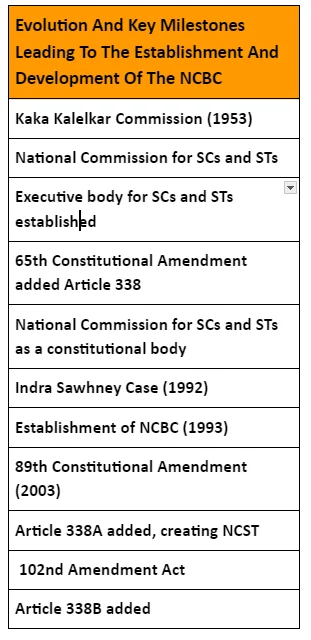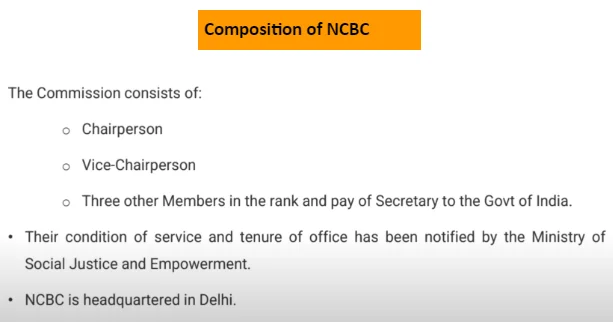The National Commission for Backward Classes (NCBC) plays a crucial role in safeguarding the rights and promoting the welfare of socially and educationally backward classes in India. Established in 1993 and gaining constitutional status in 2018, the NCBC’s evolution reflects India’s ongoing efforts to address the needs and challenges faced by these communities. Despite significant progress, the NCBC continues to face criticisms and challenges that impact its effectiveness and impartiality.
National Commission for Backward Classes (NCBC)
Evolution of Commissions for Backward Classes in India
-
- Kaka Kalelkar Commission (1953): The first backward classes commission was established on January 29, 1953, but the central government was dissatisfied with its criteria for identifying backward classes.
- Mandal Commission (1979): Formed on January 1, 1979 under the Chairmanship of Shri B.P. Mandal
- A new commission for backward classes was appointed to address the shortcomings of the previous commission.

- National Commission for SCs and STs (1987-1990):
-
-
- 1987: An executive body was instituted as the National Commission for Scheduled Castes (SCs) and Scheduled Tribes (STs).
- 1990: The 65th Constitutional Amendment added Article 338, establishing the National Commission for SCs and STs as a constitutional body.
-
- Indra Sawhney Case (1992): The Supreme Court ruled that a permanent body for backward classes should be constituted by the government.
- Establishment of NCBC (1993): Formed in August 14, 1993, The National Commission for Backward Classes (NCBC) was established as a statutory body under the Ministry of Social Justice and Empowerment.
- 89th Constitutional Amendment (2003): Article 338A was added, creating the National Commission for Scheduled Tribes (NCST).
-
-
- Matters related to Other Backward Classes (OBCs) were assigned to the National Commission for SCs and STs, leading to discontent among OBCs.
-
- 123rd Amendment Bill (2017-2018): The parliament announced the 123rd Amendment Bill to make the NCBC a constitutional body, which faced significant opposition.
-
- In August 2018, the parliament passed the 123rd Amendment Bill and the 102nd Amendment Act, making the NCBC a constitutional body and adding Article 338B.
Enroll now for UPSC Online Course
Appointment and Tenure
-
- Appointment: The body comprises the Chairperson, Vice-Chairperson, and 3 others appointed by the President by warrant under his hand and seal.
- Tenure: Tenure and conditions of service of office are determined by the President.
- Usually 3 years, under the National Commission for Backward Classes Chairperson, Vice-Chairperson and Members (Conditions of Service and Tenure) Rules, 2018.

- They cannot serve more than two terms.
Removal Process
As per National Commission for Backward Classes Chairperson, Vice-Chairperson and Members (Conditions of Service and Tenure) Rules, 2018.
- The Chairperson and Vice-Chairperson and any other Member, may, by notice in writing under his hand addressed to the President, resign his post.
Removal Process of Chairperson
- Grounds of Removal: The Chairperson shall only be removed from his office by order of the President on the ground of misbehavior after the Supreme Court, on reference being made to it by the President, has on inquiry held in accordance with the procedure prescribed by it under article 145 of the Constitution, reported that the Chairperson ought on any such ground to be removed.
- Suspension by the President: The President may suspend from office the Chairperson in respect of whom a reference has been made to the Supreme Court.
- Conflict of Interest: If the Chairperson is or becomes in any way concerned or interested in any contract or agreement made by or on behalf of the Government of India or the Government of a State of participates, he shall be deemed guilty of misbehavior.
- Removal by the President: Notwithstanding anything the President may by order remove from office the Chairperson if the Chairperson.
- Is adjudged an insolvent.
- Engaged during his term of office in any paid employment outside the duties of his office.
- Is, in the opinion of the President, unfit to continue in office by reason of infirmity of mind or body.
Removal of Vice-Chairperson and Other Members
- Undischarged Insolvent: Becomes an undischarged insolvent.
- Conviction and Imprisonment: Gets convicted and sentenced to imprisonment for an offense which, in the opinion of the President, involves moral turpitude.
- Unfit Due to Infirmity: Is, in the opinion of the President, unfit to continue in office by reason of infirmity of mind or body.
- Refusal or Incapability to Act: Refuses to act or becomes incapable of acting.
- Absence Without Leave: Is, without obtaining leave of absence from the Commission, absent from three consecutive meetings of the Commission.
- Abuse of Position: In the opinion of the President, has so abused the position of Vice-Chairperson or Member as to render that person’s continuance in office detrimental to the interest of the socially and educationally backward classes.
- Right to Be Heard: Provided that no person shall be removed under this clause until he has been given a reasonable opportunity to be heard in the matter.
Functions of the Commission
- Investigate and Monitor Safeguards: Investigate and monitor all matters relating to the safeguards provided for the socially and educationally backward classes under this Constitution or under any other law.
- Inquire into Specific Complaints: Inquire into specific complaints with respect to the deprivation of rights and safeguards of the community.
- Advise on Socio-Economic Development: Participate and advise on the socio-economic development of this community and evaluate the progress of their development under the Union and any State;
- Present Annual Reports: Present the report to the President annually and at such other times as the Commission may deem fit.
- The President places all such reports before the Parliament and also forwards any report of the Commission pertaining to a state government to the state government.
- The President and the state government place all such reports before the Parliament and State legislature, respectively, along with a memorandum explaining the action taken on the recommendations made by the Commission.
- The memorandum should also contain the reasons for the non-acceptance of such recommendations.
- Make Recommendations for Implementation: Make recommendations as to the measures that should be taken by the Union or any State for the effective implementation of safeguards and other measures for the protection, welfare, and socio-economic development.
- Discharge Other Functions: Discharge such other functions in relation to the protection, welfare, and development, and advancement of the socially and educationally backward classes as the President may, subject to the provisions of any law made by Parliament, by rule specify.
Criticisms of the National Commission for Backward Classes (NCBC)
- Lack of Historical Justification: The NCBC has been criticized for lacking a clear historical basis for identifying and defining backward classes.
- Critics argue that without understanding the historical context of social and economic disparities, the commission cannot effectively address the needs of backward classes.
- Example: the recent amendment to Article 338B has drawn attention for failing to establish criteria grounded in historical discrimination, similar to the considerations made for Scheduled Castes (SCs) and Scheduled Tribes (STs).
- Inadequate Autonomy and Political Influence: The NCBC is often seen as dependent on the central government for funding and operational decisions, which undermines its autonomy.
- This reliance can lead to political influence affecting its decisions and recommendations.
- Example: There have been instances where the identification of backward classes has become politically motivated, impacting the fairness and objectivity of the commission’s work.
- Ineffective Implementation of Recommendations: Critics point to a track record of ineffective implementation of the NCBC’s recommendations, resulting in limited benefits for the intended backward classes.
- Example: includes the delayed implementation of reservation benefits that were recommended for various backward classes.
- Unclear Identification Process: The task of identifying backward classes remains ambiguous, leading to inconsistencies in the application of benefits.
- With the 123rd Amendment Bill shifting the responsibility to Parliament for determining which communities are classified as backward, the potential for political bias increases.
- This creates confusion and may further marginalize certain communities that were previously recognized.
- Inequitable Representation: There are significant concerns about equitable representation within the NCBC, with certain groups feeling excluded from decision-making processes.
- This inequity can result in a lack of tailored policies addressing the specific needs of various backward classes.
- Example: smaller communities may not have a voice, leading to policies that do not reflect their unique challenges.
- Bureaucratic Hurdles and Delays: The functioning of the NCBC is often impeded by bureaucratic processes, leading to delays in addressing grievances and implementing solutions.
- Reports of slow response times can hinder timely interventions for communities in need.
- Limited Scope of Issues Addressed: Critics argue that the NCBC focuses too narrowly on specific issues without adequately addressing the broader socio-economic challenges faced by backward classes.
- This limited scope can neglect important factors like education, healthcare, and employment opportunities.
- Example: while the commission may address issues of reservation, it often overlooks the root causes of poverty and exclusion faced by many backward communities.
Measures to Improve NCBC and Uplift OBC Community
- Enhanced Autonomy and Independence: Provide NCBC with greater financial and operational autonomy to ensure impartial decision-making and the effective implementation of recommendations, independent from central government influence.
- Strengthen Legal Powers: Grant NCBC robust legal authority to enforce its recommendations, ensuring compliance from state governments and other authorities to effectively address the issues faced by backward classes.
- Improve Representation: Ensure equitable representation of diverse backward classes within the commission to allow for more inclusive decision-making processes that address the needs of all sub-groups.
- Publicize Caste Census Findings: The government must make public the findings of the caste census and implement reservations accordingly to ensure a data-driven approach in policy-making and resource allocation.
- Sub-Categorization of OBCs: Implement sub-categorization of OBCs to ensure less dominant OBCs have increased access to benefits such as reservations in educational institutions and government jobs.
- Launch Skill Development Programs: Government should launch separate skill development programs tailored for the OBC community to enhance their employability and socio-economic status.
- Increase Public Awareness and Engagement: Launch comprehensive awareness campaigns to educate backward classes about their rights and the existence of the NCBC, enhancing the commission’s reach and effectiveness in addressing grievances.
Enroll now for UPSC Online Course
| Must Read | |
| Current Affairs | Editorial Analysis |
| Upsc Notes | Upsc Blogs |
| NCERT Notes | Free Main Answer Writing |
Conclusion
While giving NCBC constitutional status is a step in the right direction, it is not sufficient to improve the socio-economic conditions of the OBC community.
- Ensuring proper representation, publicizing caste census findings, sub-categorizing OBCs, and launching skill development programs are essential measures.
- Additionally, enhancing the autonomy, legal powers, and public awareness of the NCBC can significantly improve its effectiveness in addressing the needs of backward classes in India.
Sign up for the PWOnlyIAS Online Course by Physics Wallah and start your journey to IAS success today!
| Related Articles | |
| National Commission for Backward Classes (NCBC) – Powers, Functions and More | Major Constitutional Amendments |
| Supreme Court | Economic Development |

 GS Foundation
GS Foundation Optional Course
Optional Course Combo Courses
Combo Courses Degree Program
Degree Program









